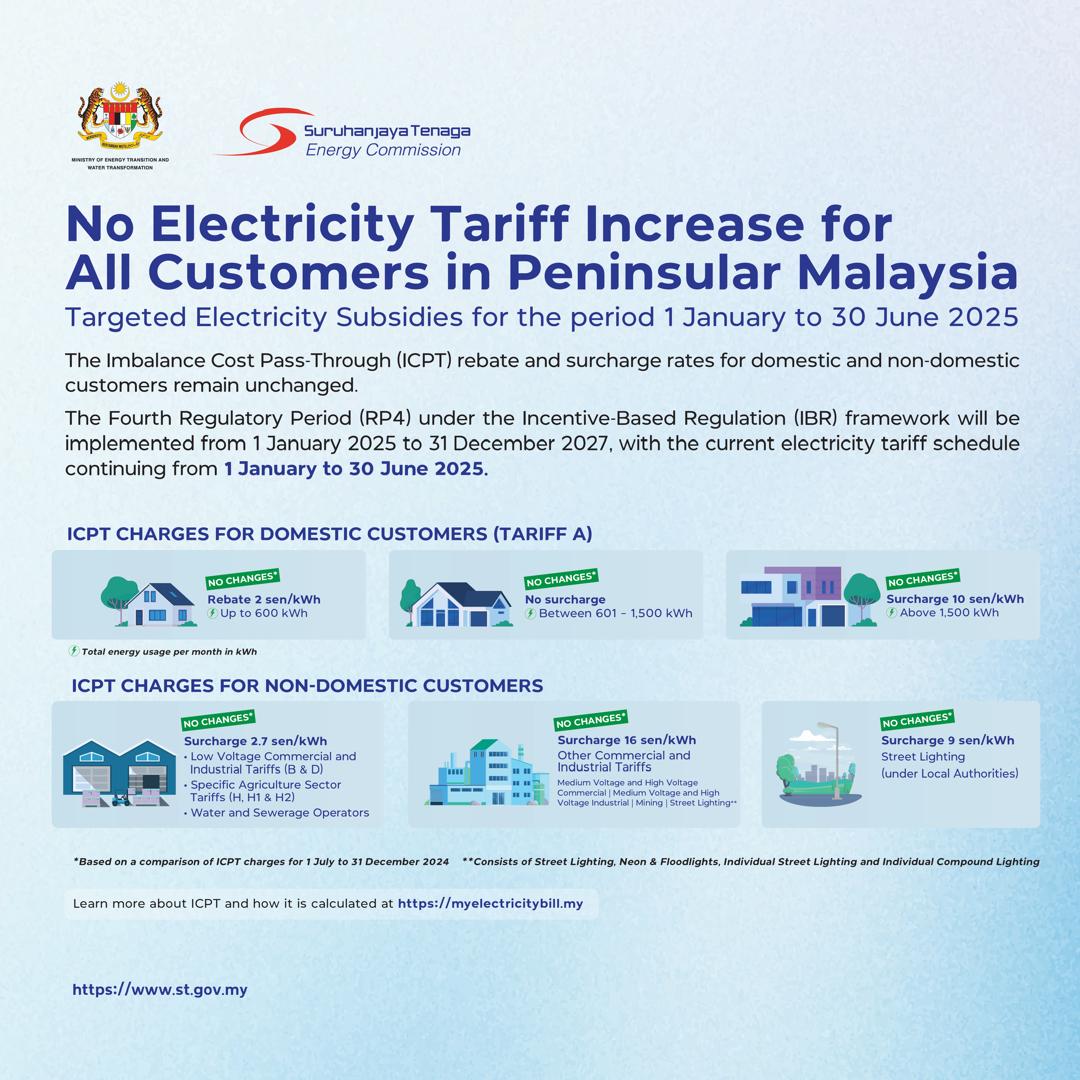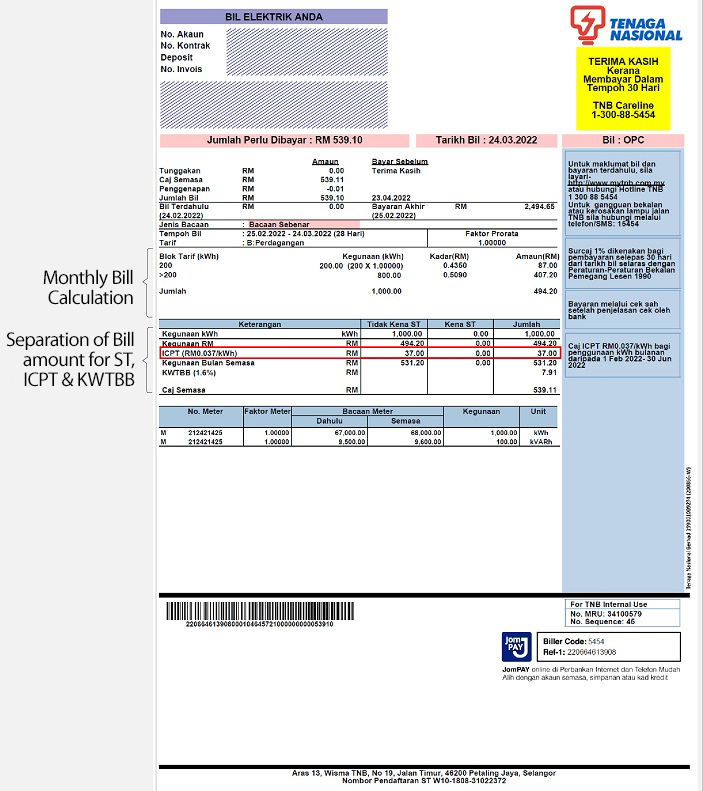Choose by categories:
ICPT - English
Key Highlights
1. What are the ICPT quantum as announced by the Government for the period of 1 January 2025 – 30 June 2025?
As announced by the Ministry of Energy Transition and Water Transformation (PETRA) on 20th December 2024, the Government has agreed to continue the implementation of the Imbalance Cost Pass-Through (ICPT) mechanism for the period of 1 January – 30 June 2025, the ICPT quantum for the period is as follows :
Domestic Customers (Tariff A) :
| Electricity consumption of 600 kWh and below | Maintained the ICPT Rebate of 2 sen/kWh |
| Electricity consumption between 601 kWh to 1,500 kWh | Exempt from the ICPT Surcharge (Zerorised) |
| Electricity consumption above 1,501 kWh | Maintained the ICPT surcharge of 10 sen/kWh |
Non - Domestic Customers:
|
Low Voltage Commercial and Low Voltage Industrial (LV), Special Agricultural tariffs (Tariff H, H1 and H2), Identified Water and Sewerage Operators |
Maintained the ICPT Surcharge to 2.7 sen/kWh |
|
Other Commercial and Industrial tariffs such as Medium Voltage (MV) and High Voltage (HV) Commercial, Medium Voltage (MV) and High Voltage (HV) Industrial, Mining and Streetlight* *Consists of Streetlights, Neon & Floodlights, Individual Streetlights and Individual Compound Lighting |
Maintained the ICPT Surcharge to 16 sen/kWh |
|
Streetlight (Under Local Authorities) |
Maintained the ICPT Surcharge to 9 sen/kWh |
Note: For Water and Sewerage Operators, the 2.7 sen/kWh surcharge covers all tariffs, excluding domestic accounts, Tariff A.
2. Who will be affected by the ICPT rebate or surcharge from 1 January 2025 – 30 June 2025?
All categories of customers, either Domestic or Non-Domestic , will be impacted by the ICPT implementation, either in the form of a rebate or surcharge, as announced by Ministry of Energy Transition and Water Transformation (PETRA) on 20th December 2024.
The electricity tariff adjustment for the customers in Peninsular Malaysia from 1 January – 30 June 2025, is as follows:

What is Imbalance Cost Pass-Through (ICPT)?
ICPT is a mechanism under the Incentive Based Regulation (IBR) framework approved by the Government and implemented since 1 January 2014 which allows TNB, as the utility, to reflect changes in fuel and other generation-related costs in the electricity tariff. This is because these costs are set based on benchmarked prices in the base tariff. The implementation of ICPT, which occurs every six (6) months would reflect the actual costs in tariff in the form of either rebates or surcharges. Furthermore, the impact of the ICPT implementation is neutral on TNB and will not have any effect on its business operations and financial position.
What are the major factors contributing to the surcharge given in ICPT for the period of 1 January 2025 - 30 June 2025?
Under the ICPT mechanism, fuel and generation costs will be reviewed every six (6) months and passed through to the customers in the form of rebates or surcharges depending on cost savings or cost increases within that stipulated period. In Peninsular Malaysia, more than 90% of the electricity generated uses coal and gas, and the cost of coal has increased significantly since October 2021.
Due to this, the cost of fuel to generate electricity has been significantly higher than the approved prices determined for the Third Regulatory Period (RP3), which has led to an increase in generation costs resulting in an ICPT surcharge. This makes a huge impact on the electricity tariffs in Peninsula Malaysia because ~57% of the generation source is from coal.
The increase in coal prices is global and beyond the Government`s control. Moreover, not just in Malaysia but also globally, all electricity generation sectors are under pressure due to the increase in fuel costs.
Who is responsible for the ICPT calculation methodology?
The calculation and methodology of the ICPT mechanism are determined by the Energy Commission (Suruhanjaya Tenaga) and are subject to the Government’s approval on a 6-monthly basis.
What are the components of the Imbalance Cost Pass-Through (ICPT) mechanism?
There are two key components in the ICPT mechanism:
-
Fuel Cost Pass-Through (FCPT): The FCPT component captures any variation in fuel costs (specific to piped gas, liquefied natural gas (LNG) and coal) due to changes in the fuel price, fuel quantity, generation mix, exchange rate, etc.
- Generation-Specific Cost Pass-Through (GSCPT): The GSCPT component captures any variation in other generation-specific costs as a result of changes in other costs associated with the Power Purchase Agreements (PPAs) & Service Level Agreements (SLAs) as well as fuel procurement contracts i.e. Coal Supply Agreement (CSA), Coal Supply and Transportation Agreement (CSTA), Gas Supply Agreement (GSA) / Gas Framework Agreement (GFA), etc.
How is the ICPT amount pass-through to customers being calculated?
The ICPT is calculated based on an estimated actual fuel cost and generation-related costs for a particular six-month period against the corresponding baseline costs in the Base Tariff.
Since 2015, Government has successfully implemented twenty (20) ICPT cycles. Furthermore, there has been no increase in electricity tariffs for all users in Peninsular Malaysia between period 1 January 2025 – 30 June 2025, demonstrating that the government is committed to ensuring the welfare of the people by continuing to protect domestic users through the implementation of targeted electricity subsidies.
How is the ICPT amount pass-through will impact my bill?
ICPT is charged for each kWh of electricity consumed. The ICPT charge is a variable component of the electricity bill where the ICPT rate is based on your monthly electricity usage. ICPT is directly passed through, and its calculation is according to the monthly electricity consumption in kWh multiplied by the ICPT rate (sen/kWh). This ICPT charge will then be added or subtracted from your current bill amount.

How is ICPT calculated for solar consumers, such as Net Energy Metering (NEM)?
Customers with solar generation such as Net Energy Metering (NEM), Self-Consumption (SelCo) are also subjected to the ICPT implementation based on the categories listed above. The ICPT calculation will be based on import consumption (kWh) from the grid. Customers with solar generation, who do not have battery storage, are still consuming energy from the grid during non-solar generating hours, and hence, are affected by the ICPT adjustments.
Do all customers pay the same amount of ICPT charges?
No. The ICPT charge on your electricity bill may differ from your neighbours as the ICPT charges depend on your energy consumption (kWh) in a month. Therefore, this amount varies from one customer to another as well as from month to month, depending on the energy consumed.
Customers are advised to implement electricity-saving measures as recommended by the Energy Commission (Suruhanjaya Tenaga) to optimise their energy consumption and cost.
What are the initiatives from the Government for customers to anticipate in the next ICPT rate?
The government has provided a user-friendly ICPT Calculation platform through MyElectricityBill which customers may reach through the Suruhanjaya Tenaga’s official website for more information. The ICPT Calculator will help customers estimate the ICPT rate on their monthly electricity bills beginning from January 2025.
The purpose of this ICPT Calculator is to educate customers to be more sensitive and alert to the changes in fuel prices and foreign exchange rates in the market. Customers can key in the coal and gas price forecasts as well as the fuel price and forex forecast to estimate the cost of ICPT at the next tariff adjustment.
Apart from that, as a measure to reduce the cost of electricity bills, customers are encouraged to practise energy efficiency. Many simple ways can be done to save and reduce electricity consumption, which are:
- Conduct energy consumption audits by monitoring and analysing electricity consumption as well as identifying equipment, processes and systems that can be improved to avoid energy wastage;
- Identify and acquire electrical appliances that have 4 or 5-star ratings which provide more electrical energy savings. Among the electrical equipment are air conditioners, refrigerators, rice cookers, microwaves, televisions and washing machines;
- Ensure all switches are off when not in use to avoid wastage of electrical energy; and
- To use the electrical appliances more efficiently, for example, setting the air conditioner temperature between24°C to 26°.
Is eKasih Program still continuing? How can eligible customers apply for eKasih?
The RM40 Electric Bill Rebate Programme is a targeted Government assistance initiative to finance monthly electricity bills of up to RM40 to those who are underprivileged and registered in the eKasih system.
The programme was announced by the Government in the 2019 Budget Speech on 2 November 2018, replacing the RM20 Electric Bill Rebate Programme, which ended in December 2018. In 2024, this programme is continued under the Miskin Tegar category of the eKasih system.
Eligibility for the RM40 Electricity Bill Rebate Programme can be verified at the Ministry of Energy Transition & Water Transformation (PETRA) portal or by contacting MyGCC hotline at 03-8000 8000 or TNB Careline 1-300-88-5454.
Eligible eKasih recipients that have an active TNB account (Tariff A, Domestic) will automatically receive RM40 rebate in their monthly electricity bills. For eligible eKasih recipients without TNB registered accounts, an application may be submitted to declare third-party accounts by submitting the application form to the nearest Kedai Tenaga.
